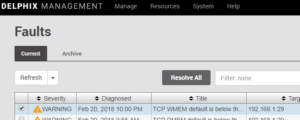
Following on from the post covering the new version 5.2 Delphix Management Interface I now need to write a part II to the Faults post, which explained the difference between ignoring and resolving faults in the Delphix virtualization engine and how to fix an accidentally ignored fault in versions prior to 5.2. As I explained there, we needed to use the CLI where we could switch the fault to resolved, which would have the effect of the fault being alerted again if it occurred. Now in Delphix 5.2 we can do this through the redesigned (and renamed) Management Interface.
Continue reading “Faults – Ignore or Resolve – Part II”

Matt is a technology consultant with over 20 years experience helping organisations around the world achieve data success using proven and emerging technologies. He is the Principal Consultant and Head Trainer at Kuzo Data.
Connect with Matt on LinkedIn.
